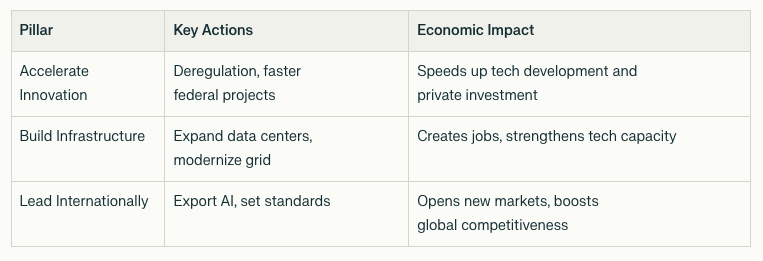Trump’s AI Action Plan: What It Is, What It Aims to Do, and Its Economic Impact

What Is Trump’s AI Action Plan?
On July 23, 2025, President Trump introduced “Winning the Race: America’s AI Action Plan,” a sweeping policy proposal aimed at making the United States a global leader in artificial intelligence. The plan is organized around three main ideas:
- Accelerating AI Innovation: The administration aims to expedite AI progress by streamlining regulations at both the federal and state levels. This could mean revising or eliminating certain rules—such as environmental regulations—that might hinder the construction of new data centers and other essential infrastructure.
- Building AI Infrastructure: The plan calls for rapidly expanding data centers, modernizing chip factories, and upgrading the national power grid to meet AI’s increasing energy demands. The administration aims to expedite permit processes and offer incentives to encourage private companies to invest.
- Leading in International AI Diplomacy: The U.S. aims to become the world’s leading exporter of AI technology, sharing comprehensive AI solutions with allies and utilizing diplomacy to counter China’s influence. The plan also aims to establish national standards for AI, discouraging states from enacting their own restrictive rules.
One key part of the plan is a rule that federal agencies should only purchase AI systems that are considered “objective and impartial,” thereby avoiding any products perceived as having a political or ideological bias. The administration has signed executive actions to make this a requirement in government contracts.
What Is the Plan Supposed to Do?
The primary objective is to help the United States “win the AI race” and maintain its strength in the global economy. Here are some of the plan’s main points:
- Spurring U.S. private sector AI innovation through deregulation.
- Rapidly expanding the nation’s AI hardware, software, and power infrastructure.
- Boosting exports of U.S.-developed AI products and expertise to allies.
- Setting unified federal policies to provide clarity and certainty for industry.
- Focusing government adoption on AI programs that align with stated neutrality standards.
How Will It Affect the U.S. Economy?
Growth in Tech and Manufacturing
Tech companies, chipmakers, and data center operators could see significant benefits from fewer regulations, faster permitting, and investment incentives. Major companies, such as Nvidia, Microsoft, and Google, might gain the most, but the construction and manufacturing industries could also see new job opportunities and growth.
Workforce and Training
In addition to creating jobs in construction and high-tech manufacturing, the plan also aims to expand AI education and training for the workforce. The goal is to help more Americans get ready for jobs in an AI-driven economy.
U.S. Global Competitiveness
By stepping up exports and working more closely with allies, the plan aims to enhance America’s influence in AI, establish global standards, and open new markets for U.S. technology. These steps could help strengthen the country’s economic position.
Potential Risks and Challenges
Some critics worry that eliminating key regulations could harm the environment or erode consumer protections. They also point out that making AI regulation a federal issue might lead to legal battles with states that want tougher privacy or ethical standards. There are also concerns that banning AI systems labeled as “ideologically biased” could limit open research and innovation.
Quick Reference: Main Pillars and Economic Effects

Disclaimer:
This article is for informational purposes only and does not constitute investment advice, an offer, or a recommendation to buy or sell any security. Investors should consult with qualified financial professionals before making any investment or business decisions related to policies or industries described herein.
Sources:
https://www.reuters.com/legal/government/trump-administration-supercharge-ai-sales-allies-loosen-environmental-rules-2025-07-23/
https://www.atlanticcouncil.org/blogs/new-atlanticist/experts-react-what-trumps-new-ai-action-plan-means-for-tech-energy-the-economy-and-more/
https://www.cbsnews.com/news/trump-uai-plan-data-centers-us-infrastructure/
https://www.dol.gov/newsroom/releases/osec/osec20250723
https://www.wilmerhale.com/en/insights/client-alerts/20250724-top-takeaways-president-trumps-new-ai-action-plan
https://www.techpolicy.press/reactions-to-the-trump-administrations-ai-action-plan
https://time.com/7304994/trump-ai-regulation-plan/
https://hai.stanford.edu/news/inside-trumps-ambitious-ai-action-plan
https://cset.georgetown.edu/article/trumps-plan-for-ai-recapping-the-white-houses-ai-action-plan/
https://www.npr.org/2025/07/23/nx-s1-5476771/trump-artificial-intelligence-woke-eo
https://www.ai.gov/action-plan
https://www.washingtonpost.com/politics/2025/07/23/trump-ai-action-plan-big-tech/












